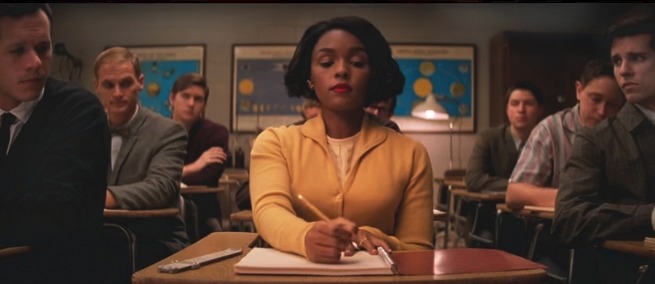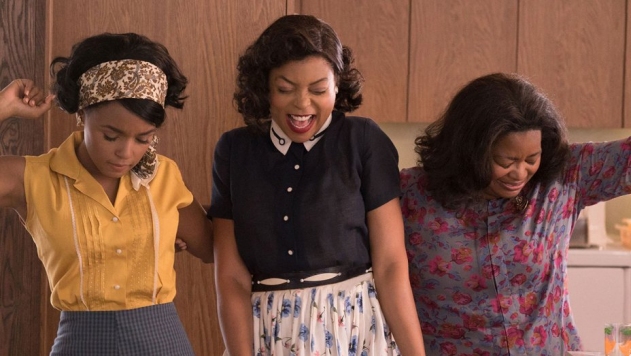
The new film HIDDEN FIGURES is based on a non-fiction book by Margot Lee Shetterly. It is about the African-American female mathematicians who worked at NASA at the start of the Cold War computing trajectories for the first men to orbit the Earth–including and especially, the late John Glenn. HIDDEN FIGURES, directed by Theodore Melfi who also co-wrote the screenplay with Allison Schroeder, has been awarded its first award by the Alfred P. Sloan Foundation. The Sloan Science in Cinema Prize, given by the San Francisco Film Society, comes with $25,000 cash.
The film was produced by FOX 2000 which optioned the rights to Hidden Figures the book based on a 55-page proposal by Shetterly. At the same time, the Sloan Foundation awarded Shetterly a writing grant so that she could complete the book. The screenwriters wrote the screenplay at the same time as Shetterly was finishing the book.
Science & Film attended a discussion about HIDDEN FIGURES featuring author Margot Lee Shetterly and actress Janelle Monáe. “There was this large group of black women working as mathematicians among a larger group of women working as professional mathematicians at NASA,” said Shetterly about uncovering this story. She grew up in Hampton, Virginia where her father worked at NASA’s Langley Research Center as a climate specialist. “Even those of us who knew the story and grew up with these women, it took a long time for us to see these women and to value their contributions.”
HIDDEN FIGURES stars Octavia Spencer as Dorothy Vaughn, Taraji P. Henson as Katherine Johnson, and Janelle Monáe as Mary Jackson. Mary Jackson was a mathematician at NASA who wanted to be an engineer. In order to apply for the position, she had to petition the courts in Virginia to allow her to attend the required classes at an all-white school. “The exciting thing about this film is that I get to portray the fighter, someone who was not going to sit back and allow discrimination to stand in the way of her dreams,” said Monáe. “[Mary Jackson] was an incredible mathematician but she knew she had something else to offer, and she changed the face of what it meant to be an engineer at NASA and became the first African-American woman.” She continued, passionately, “the great thing about this movie is it highlights our nuances as women. We are complicated, we are complex, we are complete human beings and often times we are played as one-dimensional characters. We can do it all and finally, not only will we be celebrated for being moms, or being beautiful, but we are not going to be celebrated for being objects. We are subjects to study.”

“I think as hard as it is that it’s taken this long,” said author Margot Lee Shetterly, “these women are never ever going back into the historical shadows.” Monáe added, speaking to the audience, “Now you have new superheroes.”
“Hopefully this film serves as an example of what happens when we are faced with sexism and racism–these women were dealing with Jim Crow,” said Monáe. “At this time, black women didn’t even have the opportunity to have a say so in their democracy, they couldn’t even vote. They got through it. They sent the first Americans into space. They did not allow race or gender to get in the way of making that happen, because genius has no race.” She said she thought, “if we can look at the racial tension, the divisive tactics happening during that era–they made it through that and achieved the extraordinary. If we did it back then, we can do it now. I just hope that people leave feeling a deeper sense of commitment to humanity, coming together, and setting aside our differences, and not let those things get in the way of us moving forward as a country.”

Janelle Monáe has made her career as a musician, but in the 2016 films MOONLIGHT and HIDDEN FIGURES, she makes her screen debut. “When you think about what it means to be the first, as someone who works in the music industry as well, there were a lot of things I wanted to do when I got involved [with music],” said Monáe. “I have a huge interest in science fiction and that is often not celebrated in our communities. I want to tell these untold, universal, unique stories in unforgettable ways about the uncelebrated, the other.” Referring to the film, she said, “I hope we redefine what it looks like to be scientists, to be engineers, to be mathematicians, and to be in technology.”
The screening and discussion of HIDDEN FIGURES was co-presented by FOX, Lenny Letter, Essence, and the Ms. Foundation. Harper Collins is distributing Hidden Figures in paperback. Actress Octavia Spencer is nominated for a Golden Globe for Best Supporting Actress, and Pharrell Williams, Hans Zimmer, and Benjamin Wallfisch are nominated for Best Original Score. For more, read Science & Film’s interview with Dr. Mae Jemison, the first woman of color to travel in space, and one of Janelle Monáe’s heroes.
FILMMAKERS
PARTNERS
TOPICS